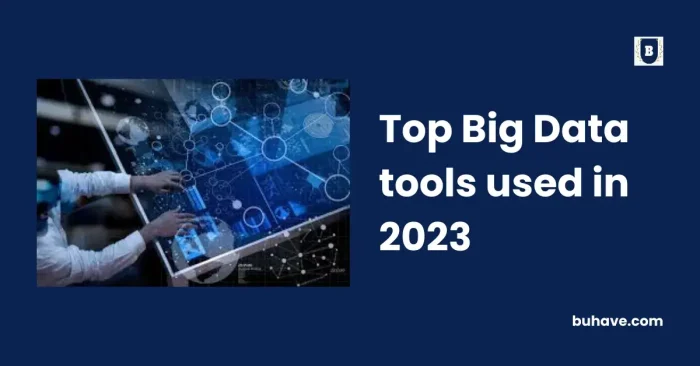Data is being generated at an unprecedented rate, and businesses need to manage and analyze this data to gain insights that can help them make informed decisions. The field of big data has emerged as a result of the need to manage and analyze large volumes of data. Big data refers to the massive amounts of data that are generated from various sources such as social media, mobile devices, sensors, and other sources. Big data tools are designed to handle and analyze this data efficiently. If you want to make a career in this field, enroll in a big data hadoop course.
In this blog, we will discuss the top big data tools used in 2023. We will start by defining big data and discussing its importance. We will then explore the different big data tools available in the market, their features, and how they can be used to manage and analyze big data.
What is Big Data?
Big data refers to the vast amounts of data generated from various sources such as social media, mobile devices, sensors, and other sources. This data is characterized by its volume, variety, and velocity. Volume refers to the massive amounts of data that are generated every second. Variety refers to the different types of data generated from different sources, such as text, images, videos, and audio. Velocity refers to the speed at which data is generated and needs to be processed.
Big data requires specialized tools and technologies to manage and analyze it effectively. These tools are designed to handle massive amounts of data, enable real-time processing, and provide insights that can help businesses make informed decisions.
Importance of Big Data
Big data has become an essential part of modern business operations. It provides businesses with valuable insights that can help them make informed decisions, improve their operations, and gain a competitive advantage.
Big data can help businesses in the following ways:
- Better decision-making: Big data provides businesses with insights that can help them make better decisions. By analyzing data from different sources, businesses can identify patterns, trends, and correlations that can inform decision-making.
- Improved customer experience: Big data can help businesses understand their customers better. By analyzing customer data, businesses can identify their preferences, behavior, and needs, and tailor their products and services accordingly.
- Operational efficiency: Big data can help businesses optimize their operations. By analyzing data from different sources, businesses can identify inefficiencies, bottlenecks, and areas for improvement.
- Competitive advantage: Big data can provide businesses with a competitive advantage. By analyzing data from different sources, businesses can identify new opportunities, predict market trends, and stay ahead of the competition.
Top Big Data Tools
There are many big data tools available in the market today. Here are the top big data tools used in 2023:
Hadoop
Hadoop is an open-source big data processing framework that enables the processing of large datasets and distributed storage. It is designed to handle massive amounts of data by breaking it down into smaller chunks and distributing it across a cluster of computers. Hadoop consists of two main components: Hadoop Distributed File System (HDFS) and MapReduce.
Apache Spark
Apache Spark is an open-source big data processing engine that enables fast, in-memory processing of
large datasets. It is designed to handle a wide range of data processing tasks, including batch processing, real-time processing, machine learning, and graph processing. Apache Spark provides a unified platform for data processing by integrating SQL, streaming, and batch processing.
Apache Spark has several advantages over traditional big data processing tools such as Hadoop. It provides faster processing speed, supports more programming languages, and is more flexible in terms of data processing tasks. Apache Spark is also easy to use, thanks to its user-friendly APIs and support for popular programming languages such as Python, Java, and Scala.
Apache Flink
Apache Flink is an open-source big data processing framework that enables real-time processing of large datasets. It is designed to handle streaming data, batch data, and graph data processing. Apache Flink provides a unified platform for data processing by integrating batch processing and stream processing.
Apache Cassandra
Apache Cassandra is an open-source distributed database management system that is designed to handle massive amounts of data across multiple nodes in a cluster. It is designed to be highly scalable, fault-tolerant, and performant. Apache Cassandra is based on a peer-to-peer architecture that enables distributed storage and processing of data.
Apache Cassandra has several advantages over traditional relational database systems such as MySQL and Oracle. It provides better scalability, availability, and fault tolerance. Apache Cassandra is also faster and more performant, thanks to its distributed architecture and support for columnar storage.
Apache Kafka
Apache Kafka is an open-source distributed streaming platform that enables real-time processing of streaming data. It is designed to handle high-throughput, low-latency data streaming from various sources such as sensors, social media, and mobile devices. Apache Kafka provides a unified platform for data streaming by integrating batch processing, stream processing, and messaging.
MongoDB
MongoDB has several advantages over traditional relational database systems such as MySQL and Oracle. It provides better scalability, availability, and performance for unstructured data. MongoDB is also more flexible in terms of data modeling and supports various data types such as arrays, embedded documents, and geospatial data.
Elasticsearch
Elasticsearch is an open-source search engine that is designed to handle big data search and analytics. It is designed to be highly scalable, fault-tolerant, and performant. Elasticsearch provides a unified platform for search and analytics by integrating search, analytics, and visualization.
Conclusion
Big data has become an essential component of modern businesses, and the tools used for handling it are constantly evolving. In 2023, the top big data tools include Apache Hadoop, Apache Spark, Apache Flink, Apache Cassandra, Apache Kafka, MongoDB, Elasticsearch, and Tableau. Each of these tools has its strengths and weaknesses, and businesses must choose the tools that best fit their needs. With these tools, businesses can handle massive amounts of data, process it in real time, and gain valuable insights that can help them make informed decisions. As technology continues to advance, we can expect to see even more innovative big data tools in the future.
– If you are looking for a guest post, write for us education article now.





